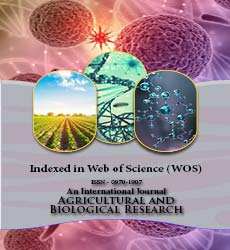Agricultural and Biological Research
RNI # 24/103/2012-R1
Arebu Hussen Yimer*, Nuru Seid Tehulie and Melesse Woldesilasie
Vermicomposting is the conversion of biodegradable wastes into a high quality chemical free bio fertilizer with the aid of earthworms. However, due to the absence of agricultural research center nearby this area, researches are not undertaken on earthworm so that the farmers and other communities are not benefited from earthworm. Therefore, this research was intended to evaluate the adaptation of different species of earthworm. The research was implemented at Borena district, South Wollo zone Ethiopia, in 2021 winter seasons. The experiment was laid out in randomized complete block design using four earthworm species namely Finote (Eisenia andrei), Weramit (Eudrilus eugeniae), Farta (Eisenia foetida) and South (Perionyx excavates) with replicated thrice. Each treatment was assigned randomly to the experimental units within a pit. The size of each experimental pit was 0.5 m × 1 m × 1 m depth, width and length respectively. Total number of cocoons, reproductive rate, number of earthworms inoculated, number of days biomass attained, growth rate and maximum weight gain data were collected and analyzed. The analysis of variance showed significant difference (P<0.05) among earthworm species in all traits. Reproductive rate and maximum weight gain were the first prioritized traits to researchers for selecting best adaptable earthworm species. The result revealed Farta specie was recorded the best reproductive rate (3.12 hatching/co) and maximum weight (1520 mg) followed by Weramit species (2.5 hatching/co) and (1424 mg), respectively. Based on ANOVA result and visual observation of researcher’s farta specie was selected. This study also indicated that proper selection of species with improved management can increase decomposition rate of vermicompost, and ready to use with a short period of time. Therefore, Farta species will be recommended in Borena district and in areas with similar agro ecological zones.
